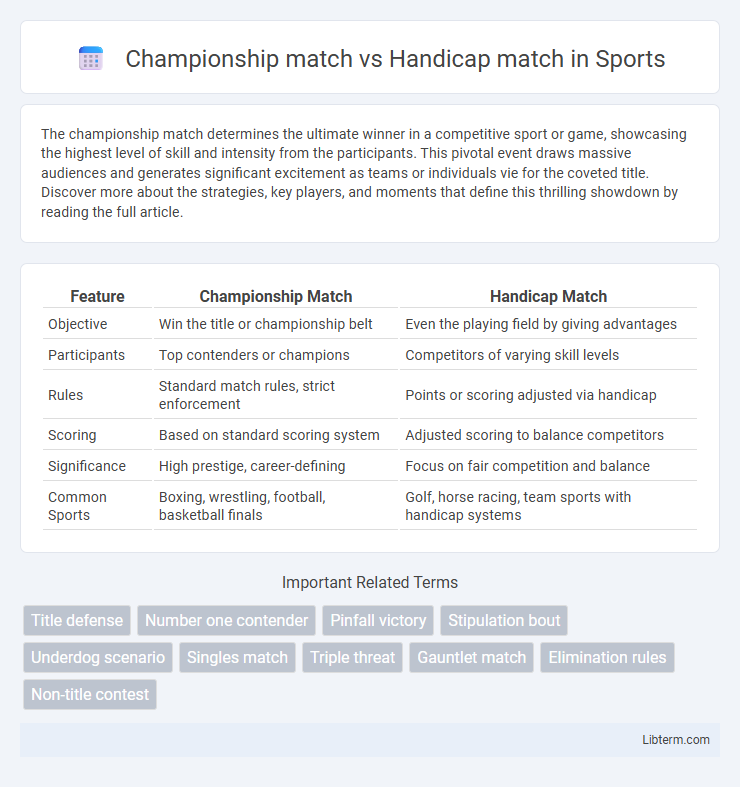The championship match determines the ultimate winner in a competitive sport or game, showcasing the highest level of skill and intensity from the participants. This pivotal event draws massive audiences and generates significant excitement as teams or individuals vie for the coveted title. Discover more about the strategies, key players, and moments that define this thrilling showdown by reading the full article.
Table of Comparison
| Feature | Championship Match | Handicap Match |
|---|---|---|
| Objective | Win the title or championship belt | Even the playing field by giving advantages |
| Participants | Top contenders or champions | Competitors of varying skill levels |
| Rules | Standard match rules, strict enforcement | Points or scoring adjusted via handicap |
| Scoring | Based on standard scoring system | Adjusted scoring to balance competitors |
| Significance | High prestige, career-defining | Focus on fair competition and balance |
| Common Sports | Boxing, wrestling, football, basketball finals | Golf, horse racing, team sports with handicap systems |
Understanding Championship Matches
Championship matches represent high-stakes contests where titles, rankings, or significant trophies are awarded, often featuring top-tier competitors vying for ultimate glory. These matches emphasize skill, strategy, and mental toughness under pressure, making them pivotal events in sports and esports alike. Understanding championship matches involves recognizing their formal structure, stringent rules, and the elevated prestige they confer compared to regular or handicap matches, which are typically designed to level playing fields by adjusting conditions or player advantages.
What is a Handicap Match?
A handicap match is a type of wrestling contest where one competitor is given a numerical advantage to level the playing field against multiple opponents, often involving uneven team sizes such as one wrestler facing two or three challengers. This format emphasizes strategy and endurance, requiring the solo wrestler to overcome significant odds and teamwork disadvantages. Handicap matches are popular in professional wrestling for showcasing individual resilience and creating dramatic, high-stakes competition.
Key Differences Between Championship and Handicap Matches
Championship matches feature the highest stakes with titles or belts on the line, often showcasing top-ranked competitors vying for prestige and recognition. Handicap matches involve uneven team sizes, such as one wrestler competing against multiple opponents, emphasizing the challenge of overcoming numerical disadvantages. The core difference lies in the purpose and format: championship matches focus on title contention with equal opponents, while handicap matches test individual resilience against multiple challengers.
Rules and Formats Compared
Championship matches typically follow standardized rules with no scoring adjustments, where the player or team that scores the highest points or goals wins outright. In contrast, handicap matches assign a predefined advantage or disadvantage to competitors based on their skill levels, often in the form of points or goals added or subtracted before the match starts. The format of handicap matches is designed to level the playing field by balancing disparities, making outcomes less dependent on absolute skill and more on strategic play.
Strategies in Championship Matches
Championship matches demand advanced strategies emphasizing endurance, adaptability, and high-pressure decision-making due to their extended formats and stakes. Competitors prioritize pacing, mental resilience, and exploiting opponents' weaknesses over a prolonged period, unlike handicap matches that focus on overcoming numerical disadvantages with aggressive, immediate tactics. Mastery of strategic depth, psychological warfare, and calculated risk-taking defines success in championship match scenarios.
Tactics Unique to Handicap Matches
Handicap matches require wrestlers to adapt their tactics by focusing on isolating opponents and exploiting numerical advantages with strategic teamwork. Competitors often use quick tags, double-team maneuvers, and heightened ring awareness to maintain control and wear down opponents more effectively. Timing and coordination become crucial to outmaneuver opponents and capitalize on the uneven match dynamics unique to handicap formats.
Impact on Wrestlers’ Performance
Championship matches elevate wrestlers' performance by increasing stakes and motivation, often leading to more intense and technically precise bouts. Handicap matches challenge wrestlers' endurance and adaptability by requiring one wrestler to face multiple opponents, highlighting teamwork and resourcefulness. The differing demands of these match types significantly affect wrestlers' physical output and strategic approaches in the ring.
Fan Reactions and Audience Appeal
Championship matches generate intense fan reactions due to their high stakes and definitive outcomes, inspiring passionate support and widespread media coverage. Handicap matches appeal to audiences by showcasing unique challenges and underdog narratives, creating unpredictable entertainment and increased viewer engagement. Fan communities often debate the excitement and fairness between both formats, reflecting divergent preferences that shape event popularity and broadcast ratings.
Historical Examples of Both Match Types
Championship matches in wrestling, such as the iconic Hulk Hogan vs. Andre the Giant at WrestleMania III in 1987, have historically drawn massive audiences due to their high stakes and title implications. Handicap matches, exemplified by the 3-on-1 bouts like Triple H facing D-Generation X against The McMahons at King of the Ring 1999, showcase unique storytelling by pitting uneven teams against each other. Both match types have evolved through the decades, prominently featured in WWE and other promotions to heighten drama and engage fans with varying match dynamics.
Which Match Type Delivers More Drama?
Championship matches deliver more drama by featuring high stakes, intense rivalries, and the ultimate prize that players strive to win, creating heightened emotional investment for fans. Handicap matches introduce strategic imbalance, generating unpredictable outcomes as one competitor faces a numerical or skill disadvantage, which adds excitement but lacks the inherent prestige of championships. The elevated tension and significance of championship matches make them the preferred choice for delivering memorable, dramatic moments.
Championship match Infographic

 libterm.com
libterm.com